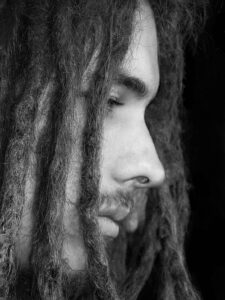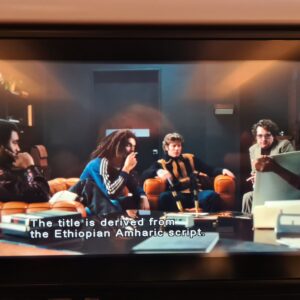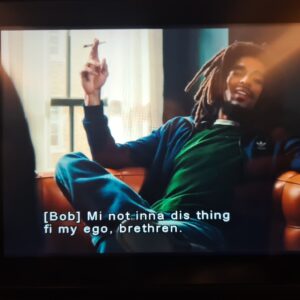There are still places where you can see the “biopic” about the life of the Jamaican reggae star musician Bob Marley. The title of the film is One Love, a kind of slogan of the Rastafari movement, of which Marley was a prominent member. All religions seem to have love as a central topic, but representatives of the major religions sometimes forget that. It is also the title of a Bob Marley song with more than a quarter billion views on Youtube.
Bob Marley was a Rastafari. Rastafaris believe that their God is a living man and living in Africa, and they pointed to emperor Haile Selassie of Ethiopia as their living god Jah – at least until the emperor died in 1974. Rastafaris wear dreadlocks, and they may not cut their hair either. Many are vegetarians.

Bob Marley was, and is, the world’s most famous reggae musician. Reggae is a type of music initiated in the endlessly creative circles of Jamaica, at the time a new kind of pop music with special rhythms, and it became closely associated with Rastas. I am sure everyone is familiar with the musical genre. Marley died way too young in 1981, at an age of 37, after suffering for some years from cancer.
Marley was also an idealist. When he was young, the streets of Jamaican cities were a battle grounds for violent competing gangs. He wanted the population to unite, but some of the locals did not like that and attempted to murder him, and they shot his wife (not the deputy….), and luckily all survived the assault. Bob Marley had a gun wound in his arm and on his chest. Despite that, they decided to perform.

The film One Love shows the turbulent and successful years of the charismatic man with the characteristic dreadlocks, and his band. His album Exodus of 1977, by Bob Marley and the Wailers, was chosen as the best album of the century by Time in 1999.
The new film leads to many reflections about language.
Bob Marley was a global success in the 1970s and 1980s, where English speakers were confronted with his texts, sometimes deemed unintelligible by listeners. There are at least three reasons for that. First, sometimes he did not sing in English, but phrases in Jamaican Creole, the home language of most Jamaicans. Second, sometimes he used rather archaic English words from the Bible, and those exalted terms are found throughout the songs. Third, Rastas have a tendency to change words and give them new meanings.

Indeed, Rastafaris also tried to change the language to make it more inclusive. For instance: what is “I-N-I vibration positive” in the hit song Positive vibration. Here, INI are not letters, but it stands for “I and I”. The word “we” is considered too excluding, therefore instead of a first-person plural pronoun, two first person singular pronouns are used. In the film, you can also hear I-nity, instead of unity (you-nity), and a few more examples are mentioned in the film. To learn more about this aspect of Rasta Talk, go here https://www.wikihow.com/Speak-Rastafarian-English. They created words like politricks and overstanding and innerstanding, on the basis of English understanding.

Language use in the film is quite interesting. It vacillates between the exalted words from Christianity and the low-status creole language (but a full and complete one) of Jamaica. In the film, much of the conversation is in Creole, locally named Patwa. Patwa, even though it has English words, is not intelligible to speakers of English. A creole language is a new language that emerged from a colonial or expanding language. Most words are from English, but they are pronounced in ways influenced by the African forefathers of the Jamaicans. And the grammar has also been significantly innovated.
My English teacher would probably not approve of a song text like “Them Belly full but they hungry”. She would have said it should be: “their belly is full, but they are hungry.”
I happened to be in the good company of a number of Jamaicans while writing this review, and aurally surrounded by reggae songs, and we asked them about the film.
All three of them were positive about the film. They were proud that the whole film was shot in Jamaica, in contrast to the film Pirates of the Caribbean, which, though set in (and near) Jamaica, that film was filmed in the southern Caribbean islands. Some think that was not good style. They told us that the film was widely anticipated in Jamaica, and it also appeals to a Jamaican audience. They said it was a conscious decision to have the film without subtitles, as texting would be potentially insulting to Jamaicans. Thousands of Jamaicans participated in the film, including for the filming of the concert in Kingston, Jamaica. The three Jamaicans all express their satisfaction about the depiction of the Jamaican language of the time (the 1970s) and all three were satisfied with the way this was done.
 Lingoblog spoke also with Jamaican Joseph Farquharson, and he appeared to have been involved as a dialect assistant for the film. Film producers sometimes hire linguists to make sure that the language used in a film is a reliable reflection of how people spoke at that time and that place. For that they contacted the Jamaican Language Unit (JLU) located at the University of Mona, Jamaica. Joseph Farquharson was involved in that, and he was praised by the linguists we spoke with for his work, and they added that the language was also positively appreciated by the film viewers, and they were not language professionals.
Lingoblog spoke also with Jamaican Joseph Farquharson, and he appeared to have been involved as a dialect assistant for the film. Film producers sometimes hire linguists to make sure that the language used in a film is a reliable reflection of how people spoke at that time and that place. For that they contacted the Jamaican Language Unit (JLU) located at the University of Mona, Jamaica. Joseph Farquharson was involved in that, and he was praised by the linguists we spoke with for his work, and they added that the language was also positively appreciated by the film viewers, and they were not language professionals.
The film makers made an important decision: the film must not be subtitled for creole. That is very well understandable with a Jamaican audience, who will be able to follow the dialogues, but my impression is that quite a bit would get lost for English speakers unfamiliar with Patwa. I was lucky enough to see it with subtitles, however, sitting in an airplane (I know, bad conscience, apologies that I contribute to future generations of humans to be burnt on earth; sorry about that). The subtitles showed English when English was spoken, and Creole when that language was spoken, as can be seen in the stills from the film. I am not sure which versions of the film have subtitles. I was happy that there were subtitles. My Jamaican companions thought that only very little would be unintelligible without subtitles, but I think it is more than a little.
For people who are interested in the linguistic choices made in the process of making the film, and the challenges they faced, you can see a dialogue between language specialists, dialect coaches and the actor Kingsley Ben-Adir here:
Biopics about dead or old pop-musicians have been a trend for a couple of years now. I liked the band Queen to some extent, but I found the film Bohemian Rhapsody beautiful. I have never like Elton John’s music, but I loved the biopic, very impressive and moving. My filmmate went back the next evening to see it again, he loved it. I still don’t like the Elton John songs, though. I love the best Bob Marley songs, but I am not very enthusiastic about the film. Kingsley Ben-Adir, who plays Bob Marley, is a Brit who had to learn to speak Jamaican like Bob Marley, and he did an excellent job, but he does not have Bob Marley’s charisma. He heard Jamaican from his Jamaican friends in Britain, and he studied interviews with Marley in order to make his language use sound as authentic as possible. The film is fine to watch, but do not expect a masterpiece. The language, however, is, according to the experts, brilliantly done.
(thanks to Joseph Farquharson of the Braadkyaas Jamiekan and Jamaicans S and C)
See the trailer of One Love here:
As Bob Marley has passed away, it is impossible to hear him and his ban live. Luckily there is an approximation, the One Love Marley Band, based in Denmark. One can book them for concerts!
Peter Bakker built his first guitar when he was ten years old, but he never learned to play it, nor any other musical instrument. When he had to choose between a career as a choir singer (the only musical possibility left, given his lack of any musical talent) and a life as a linguist, he chose for the latter. The University of Aarhus even employs him as a linguist. In his opinion, the best music ever was made in the Middle Ages and in the 1960s and 1970s.








Haile Selassie was the emperor of Abyssinia or nowadays Ethiopia, not of Egypt.
Nice blog on Bob Marley!
Thanks for the compliment, and sorry about the error, you are right, it has been corrected.